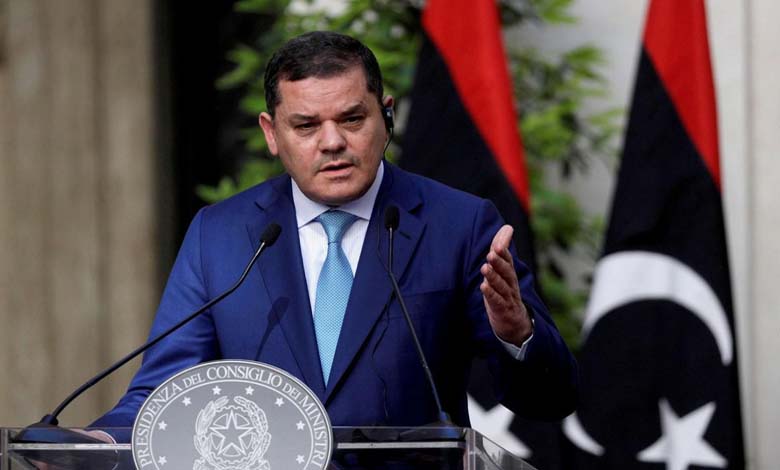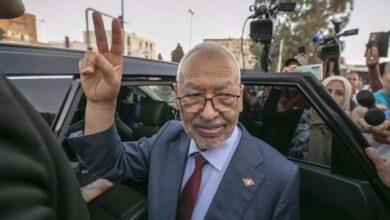Escalating Tensions Between Dbeibah and Parliament Over Parallel Spending

Libya’s Prime Minister of the Government of National Unity, Abdelhamid Dbeibah, has strongly criticized the Parliament’s decision to allocate a separate budget for the so-called Development and Reconstruction Fund of Libya, denouncing it as a direct threat to economic stability and an attempt to impose a parallel financial system outside the state’s unified structure.
-
Dbeibah Sidesteps Resignation Calls by Proposing Direct Elections
-
Dbeibah Turns to the Muslim Brotherhood, Haftar Warns of Decisive Moment… Libya on a Knife’s Edge
-
Complications Hindering the Evacuation of Militias from Tripoli
Amid mounting political divisions, Dbeibah reaffirmed his firm rejection of any “parallel public spending channels.” In a meeting with members of the High Council of State, as reported by the official platform “Our Government” on Facebook, he warned that such actions undermine Libya’s economy and bypass legitimate institutions. He cautioned that unplanned financial burdens would drain national reserves and directly affect Libyan citizens.
His comments came shortly after a parliamentary session in Benghazi, led by Aguila Saleh, during which a committee was formed to prepare a budget for the Development and Reconstruction Fund, chaired by Belkacem Haftar, son of Field Marshal Khalifa Haftar. Created in 2021, the fund is tasked with contracting global companies for reconstruction projects in war-affected regions — with direct funding from the Parliament, bypassing Tripoli’s government.
-
How Dbeibah Planned to Eliminate His Former Ally “Gheniwa” – A BBC-Affiliated Report Reveals
-
Gheniwa’s Blood Strangles Dbeibah… Tripoli’s Nero Burns in His Own Fire
-
Armed Clashes in Tripoli Reveal Fragility of Security Situation
The unity government views this step as a serious breach of financial governance and an effort to institutionalize “parallel authority” in eastern Libya. Observers see this not merely as an administrative dispute but as a clear political battle over financial control and oil revenues.
These developments come against a backdrop of rising tensions in Tripoli, marked by clashes between armed groups — some loyal to the unity government — and protests both for and against Dbeibah. This volatile situation further complicates an already deepening crisis.
-
Dbeibah defends decisions to neutralize armed groups despite rising violence
-
Financial Strangulation and Stalled Dialogue with Haftar Threaten Dbeibah’s Government Continuity
-
Libya’s Muslim Brotherhood Incites Armed Resistance Against Peaceful Solutions
Dbeibah has rejected any interference from Parliament in managing state resources or launching financial funds outside the internationally recognized framework. Meanwhile, the rival government led by Osama Hammad, backed by the Parliament, has threatened to halt oil production or declare a “force majeure” if it continues to be sidelined as a legitimate authority over large parts of the country.
Dbeibah directly accused the Parliament of orchestrating unlawful spending, claiming that over 100 billion Libyan dinars were spent outside the official budget in the past two years. He called on Speaker Aguila Saleh to provide a transparent report detailing the fate of these funds.
-
Mohammed el-Menfi intensifies pressure on Dbeibah by criticizing spending file
-
Dbeibah after the Blinken meeting : Libya mercenaries must leave
-
Washington does not want Moscow to dominate the Libyan scene
-
Haftar urges the formation of a unified government to oversee the elections
He added that these practices have contributed to the devaluation of the Libyan dinar, undermined investor confidence, fueled inflation, and reduced citizens’ purchasing power. Economic experts warned that parallel budgets would immediately impact the dollar’s exchange rate on the black market, worsening living conditions.
In April, the Central Bank of Libya devalued the dinar against foreign currencies — a move analysts say resulted directly from uncoordinated spending by the two rival governments, worsening public finances and increasing domestic debt.
-
UN and Regional Efforts to Contain Tensions in Tripoli
-
Demands for Formation of a New Government in Libya Pose Challenges for Dbeibeh
-
Libya: A vote of confidence session would hold on March 8 Sirte
-
The Smoke of Tripoli Clashes Still Rises: Political Economic and Security Repercussions
For the past three years, Libya has experienced institutional division between two rival governments: one led by Dbeibah in Tripoli, internationally recognized, and the other led by Osama Hammad, appointed by the eastern-based Parliament. The struggle for legitimacy and control of national wealth continues, with money, the military, and the media as its key tools.
Despite international mediation efforts — especially by the UN mission — no political breakthrough has been achieved. As threats to oil production mount and Tripoli’s government refuses parallel financing, the country appears to be entering a new phase of political and financial confrontation. Ultimately, the Libyan people remain the greatest victims, as the country’s resources are wielded as bargaining chips in a relentless power struggle.
-
Salvation Friday: Libyans Hold Their Breath Amid Fears of Militia Chaos
-
Where is Western Libya Heading? Open Scenarios for the Future of the Conflict
-
Militia Arms Chaos Reignites Violence Spiral in Tripoli
-
Al-Gharyani Leads Hate Speech against Migrants… and Dbeibeh Plans to Return to War
-
The Brotherhood’s Mufti and Dbeibeh… An Alliance Driving Libya toward Catastrophic Scenarios
-
Corruption and Terrorism Financing Drive Washington to Suspend Aid to Libya
-
Calls in Libya to Prevent Tunisian Arrest Warrant against Muslim Brotherhood Businessman
-
Clashes Between Militias in Tripoli Mar Eid Atmosphere
-
After the arrest of a State Council Deputy in Derna… Libya’s Brotherhood obstruct solution initiatives again
-
Haftar grants Dbeibeh a deadline for the fair distribution of oil revenues and threatens war
-
Haftar present his backing to Libya’s peace operation
-
Libya: The New PM postpone the designation of the government
-
Libyan candidates talk and militias mobilize as electoral process collapse
-
French diplomatic source: Pro-Turkish Syrian militia in Libya is starting to remove
-
Libyan Expert: Dbeibeh’s Move Is Too Late… Militias Have Become Partners in Power












